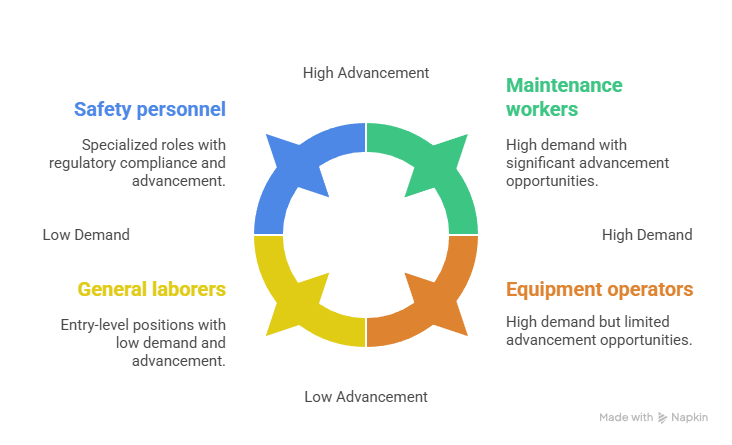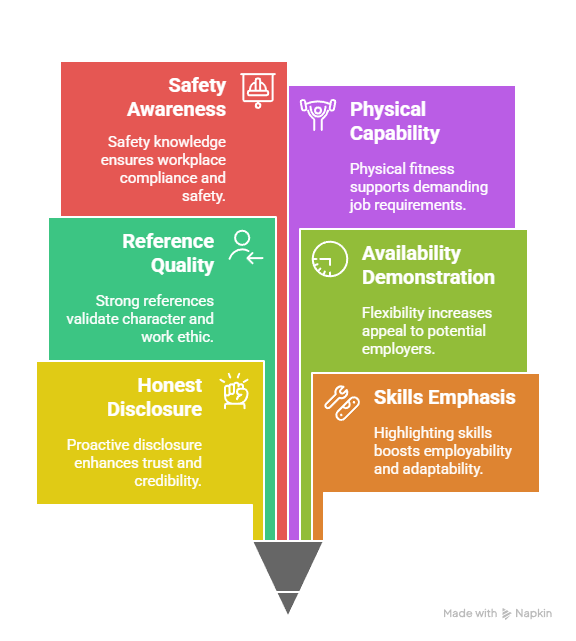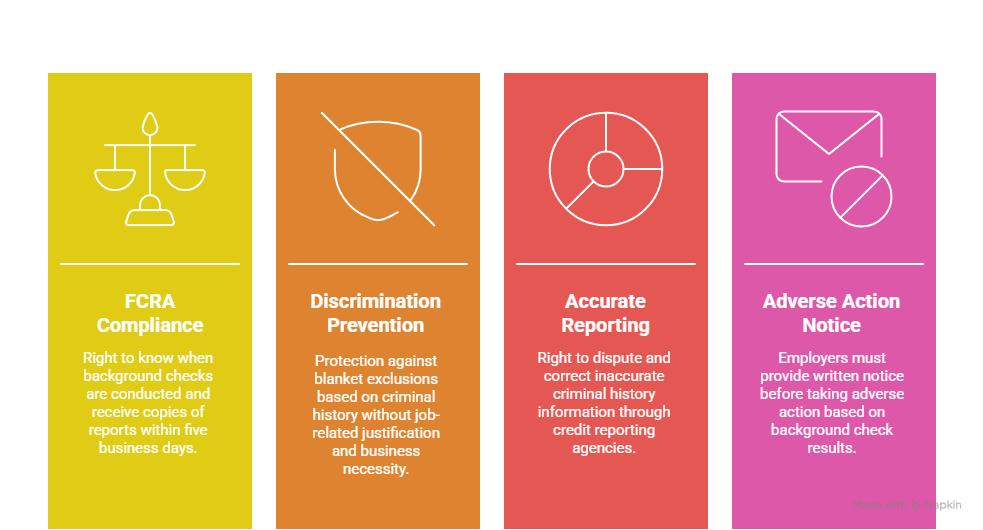North Dakota's oil fields offer exceptional second chance employment opportunities, with starting wages often exceeding $20-25 per hour and comprehensive benefits packages. The state's ongoing energy boom creates substantial demand for workers with criminal backgrounds, as oil companies prioritize work ethic and reliability over past mistakes.
Key Takeaways
- High wages available: Entry-level oil field positions typically start at $45,000-$55,000 annually, with experienced workers earning $70,000-$100,000+
- Minimal background requirements: Many oil companies focus on current character rather than criminal history, especially for non-financial positions
- Multiple pathways exist: From direct hire opportunities to staffing agencies specializing in second chance employment
- Housing assistance provided: Many employers offer housing allowances, temporary lodging, or company housing to address accommodation challenges
- Career advancement potential: Oil industry provides clear promotion paths from entry-level to supervisory and specialized technical roles
- Comprehensive benefits: Most positions include health insurance, retirement plans, and overtime opportunities that significantly boost total compensation
Why North Dakota's Oil Fields Welcome Workers with Criminal Records
North Dakota's Bakken oil field region faces persistent labor shortages that create unique opportunities for job seekers with criminal backgrounds. The state's unemployment rate in 2025 consistently ranks among the lowest nationally at 2.1%, forcing employers to adopt more inclusive hiring practices. Oil companies have discovered that workers seeking second chances often demonstrate exceptional loyalty and work ethic.
The physical demands and remote locations of oil field work naturally attract individuals willing to prove themselves through hard work. Unlike traditional corporate environments, oil field employers prioritize practical skills, reliability, and safety consciousness over background checks. This industry culture creates an ideal environment for felons seeking meaningful employment with growth potential. Many companies actively recruit from reentry programs and halfway houses throughout the region.
Oil field jobs for felons in North Dakota represent some of the most accessible high-paying opportunities available nationwide. The energy sector's focus on performance-based advancement allows workers to quickly move beyond entry-level positions. Companies value dedication and reliability over educational credentials or employment history gaps.
Labor Shortage Creates Opportunities
The Bakken region requires approximately 18,000-22,000 additional workers annually to meet production demands in 2025. Companies struggle to fill positions despite offering competitive wages and comprehensive benefits packages.
Critical staffing needs include:

- Equipment operators: High demand for machinery operation across drilling sites
- General laborers: Entry-level positions with immediate availability requirements
- Maintenance workers: Technical support roles offering advancement opportunities
- Safety personnel: Regulatory compliance positions with specialized training provided
This ongoing shortage has prompted many employers to eliminate automatic disqualifications based on criminal history. Forward-thinking companies recognize that skills and dedication matter more than past mistakes.
Highest-Paying Oil Field Jobs for Felons in 2025
Bakken oil field employment offers starting wages significantly above national averages. Most companies provide rapid advancement opportunities based on performance rather than tenure. The combination of base wages, overtime pay, and bonuses creates substantial earning potential for dedicated workers. Second chance employment oil industry positions typically include comprehensive benefits packages that rival traditional corporate jobs.
Oil field careers typically follow predictable progression paths that reward skill development and safety records. Workers can advance from general labor positions to specialized technical roles within 18-24 months of consistent employment. Many companies provide tuition reimbursement for industry-relevant certifications and training programs. Equipment operation and technical maintenance roles offer the highest advancement potential.
North Dakota oil jobs for felons often include additional compensation beyond base wages. Shift differentials, hazard pay, and performance bonuses can increase annual earnings by 20-30%. Many positions also offer profit-sharing programs that provide substantial year-end payments based on company performance.
| Position | Starting Wage | Experience Required |
| General Laborer | $22-26/hour | None |
| Equipment Operator | $26-32/hour | 6 months experience |
| Maintenance Technician | $28-35/hour | Technical training preferred |
| Production Operator | $30-36/hour | Company training provided |
| Safety Coordinator | $35-42/hour | Certification required |
Companies actively recruit from rehabilitation programs and reentry organizations throughout the region. This proactive approach demonstrates the industry's commitment to providing meaningful employment opportunities.
Specialized Technical Positions
Technical roles offer the highest earning potential but may require additional training or certifications. Many employers provide comprehensive on-the-job training programs that allow workers to develop specialized skills while earning competitive wages.
- Wellhead Technician positions: Starting at $32-38 per hour, these roles involve maintaining and repairing wellhead equipment. Workers receive extensive safety training and equipment operation certification. Most companies provide tool allowances and vehicle assignments for field work. Career advancement often leads to supervisor or trainer positions within 2-3 years.
- Production Operator roles: Beginning at $30-36 per hour, operators monitor production systems and ensure optimal well performance. These positions require attention to detail and basic mechanical aptitude. Companies provide computer training for monitoring systems and data collection. Overtime opportunities frequently increase annual earnings to $65,000-80,000 ranges.
Companies Actively Hiring Felons in North Dakota's Oil Fields
Several major oil companies and contractors maintain explicit policies welcoming workers with criminal backgrounds. These employers recognize that past mistakes don't predict future performance in demanding physical work environments. Many companies partner with reentry organizations to identify qualified candidates seeking second chances. Staffing agencies specializing in oil field placement often have established relationships with felon-friendly employers.
- Halliburton Services: Major oilfield services company offering comprehensive training programs and advancement opportunities for all workers regardless of background
- Schlumberger Technology: Global energy company providing technical training and career development paths with skills-based hiring policies
- Baker Hughes: Integrated energy technology company emphasizing work ethic over background screening for most field positions
- Marathon Oil Corporation: Independent exploration company with inclusive hiring practices for production and maintenance roles
- Continental Resources: Regional operator focusing on local hiring with flexible background policies for non-supervisory positions
Regional contractors and smaller operators often provide the most flexible hiring policies. These companies frequently need workers immediately and focus primarily on work ethic and reliability. Local drilling contractors typically hire 50-100 workers annually with minimal background restrictions.
Staffing Agencies and Placement Services
Specialized staffing agencies understand the unique challenges facing job seekers with criminal records. These agencies maintain relationships with employers specifically seeking workers willing to prove themselves through hard work.
Express Employment Professionals and similar agencies provide additional support services including housing assistance and transportation coordination. Many agencies offer same-day placement for qualified candidates with valid identification and transportation. Temporary-to-permanent placement programs allow workers to demonstrate reliability before receiving direct hire offers.
Application Strategies and Interview Preparation
Successful oil field job applications require honesty about criminal history while emphasizing relevant skills and motivation. Many employers appreciate direct, straightforward communication about past mistakes and future goals. Applications should highlight physical capabilities, reliability, and willingness to work in challenging conditions. Interview preparation should focus on demonstrating genuine commitment to stable employment and career growth.
Employers want to see evidence of personal responsibility and lessons learned from past experiences. Specific examples of overcoming challenges or developing new skills create positive impressions with hiring managers. Most oil field employers conduct interviews focused on practical considerations rather than detailed background exploration. Questions typically center on physical capabilities, safety awareness, and commitment to long-term employment.

- Honest disclosure: Address criminal history proactively rather than waiting for background check discoveries
- Skills emphasis: Highlight transferable skills from previous employment, military service, or vocational training programs
- Reference quality: Provide references who can speak to character development and work ethic improvements
- Availability demonstration: Show flexibility regarding work schedules, overtime, and travel requirements for field assignments
- Safety awareness: Express understanding of workplace safety importance and willingness to follow protocols
- Physical capability: Confirm ability to perform demanding physical work in various weather conditions
Preparation should include researching specific companies and understanding their operational focus. Knowledge of basic oil field terminology and processes demonstrates genuine interest in the industry. Most successful candidates emphasize their reliability, punctuality, and willingness to learn new skills.
Documentation and Requirements
Standard documentation requirements include valid identification, Social Security card, and completion of basic safety training. Many companies provide safety training during orientation, eliminating this as a barrier to employment.
| Document Type | Requirement Level | Notes |
| Valid Driver's License | Preferred | State ID acceptable for most positions |
| Social Security Card | Required | Replacements available through SSA |
| Safety Certifications | Training provided | Company-sponsored OSHA programs |
Some positions may require drug testing and basic physical examinations. Most companies conduct these assessments after conditional job offers to avoid discriminatory practices.
Living and Housing Options in North Dakota Oil Communities
North Dakota's oil boom communities offer various housing solutions for workers relocating from other states. Many employers provide housing assistance or temporary accommodations to help new employees establish residency. The combination of high wages and employer support makes relocation financially feasible for most workers. Temporary housing options include extended-stay hotels, RV parks, and company-provided dormitories or apartments.
Many workers initially utilize temporary arrangements while searching for permanent housing solutions. The strong job market and high wages enable most employees to secure permanent housing within 3-6 months of employment. Permanent housing markets in oil communities remain competitive but accessible for workers earning oil field wages. Rental costs typically range from $900-1,600 monthly for one-bedroom apartments, while house purchases start around $175,000-225,000 in 2025.
- Employer housing allowances: Monthly stipends of $600-1,400 to offset accommodation costs and utility expenses
- Company housing: Dormitory-style or apartment accommodations provided at 40-60% below market rates
- Relocation assistance: Moving expense reimbursement up to $3,000 and temporary lodging during job transition periods
- RV park partnerships: Discounted rates at extended-stay RV facilities near work sites with utility hookups included
- Shared housing programs: Company-sponsored roommate matching services for cost-effective housing solutions
Community support services help new residents adjust to rural living conditions. Local organizations provide information about healthcare, shopping, and recreational opportunities. Many communities offer orientation programs specifically designed for oil field workers.
Community Support Services
Oil boom communities provide essential services supporting new residents, including medical facilities, grocery stores, and recreational activities. Many communities also offer support groups and counseling services specifically designed for individuals transitioning from incarceration to stable employment.
Healthcare access includes urgent care clinics and regional hospitals within reasonable driving distances. Most employers provide comprehensive health insurance that covers local medical services. Mental health and substance abuse counseling services are readily available through community health centers. These resources help ensure successful long-term integration into the community and workplace.
Legal Considerations and Rights for Felon Job Seekers
North Dakota employment law provides certain protections for job seekers with criminal histories, though these protections are more limited than in some other states. Understanding legal rights helps job seekers navigate the application process more effectively. However, oil field work generally involves fewer legal complications than many other industries. The Fair Credit Reporting Act (FCRA) requires employers to follow specific procedures when conducting background checks.
Employers must provide disclosure forms and obtain written consent before running background checks. Job seekers have rights to dispute inaccurate information and request copies of background reports used in hiring decisions. Most oil field positions fall outside regulated industries that automatically exclude individuals with certain criminal convictions. This creates more opportunities compared to financial services, healthcare, or childcare employment.

- FCRA compliance: Right to know when background checks are conducted and receive copies of reports within five business days
- Discrimination prevention: Protection against blanket exclusions based on criminal history without job-related justification and business necessity
- Accurate reporting: Right to dispute and correct inaccurate criminal history information through credit reporting agencies
- Adverse action notice: Employers must provide written notice before taking adverse action based on background check results
Legal protections also include the right to explain circumstances surrounding criminal convictions during the hiring process. Many employers appreciate candidates who take responsibility for past actions while demonstrating positive changes.
Disclosure Requirements and Timing
North Dakota law doesn't prohibit employers from asking about criminal history on initial applications, though many oil companies delay background checks until after initial interviews. Understanding when and how to disclose criminal history can improve application success rates.
Proactive disclosure often creates better outcomes than waiting for background check discoveries. Most successful candidates address criminal history during initial interviews while emphasizing rehabilitation efforts and career goals. Timing disclosure appropriately allows candidates to establish rapport before discussing sensitive topics. Employers typically appreciate honesty and directness rather than attempts to hide or minimize past issues.
Training Programs and Skill Development Opportunities
Oil field employers in North Dakota invest heavily in worker training and development programs throughout 2025. Most companies provide comprehensive orientation programs lasting 1-2 weeks that cover safety protocols, equipment operation, and industry-specific skills. These programs are designed for workers with no previous oil field experience. On-the-job mentoring pairs new employees with experienced workers for practical skill development.
Many employers offer tuition reimbursement for relevant vocational training and certification programs. Community colleges throughout North Dakota provide specialized courses in petroleum technology, industrial maintenance, and heavy equipment operation. These educational opportunities help workers advance to higher-paying technical positions. Professional development programs often lead to supervisory roles within 2-3 years of employment.
- OSHA safety certification: Required 10-hour or 30-hour training provided by employers at no cost to workers
- Equipment operation training: Hands-on instruction for cranes, forklifts, and specialized drilling equipment with certification testing
- Technical maintenance programs: Electrical, mechanical, and hydraulic system training through community college partnerships
- Leadership development: Supervisory skills training for workers showing advancement potential and strong safety records
- Hazardous materials handling: Specialized certification for chemical handling and environmental compliance procedures
Continuing education opportunities help workers stay current with industry developments and safety regulations. Many companies provide paid time off for training attendance and certification renewal.
Certification and Advancement Pathways
Industry certifications significantly increase earning potential and job security for oil field workers. Most certifications can be obtained while working full-time through evening or weekend programs.
Popular certifications include crane operation, welding, electrical maintenance, and safety coordination. These specialized skills often increase hourly wages by $3-8 per hour. Certification costs are typically covered by employers or available through state workforce development programs. Advanced certifications can lead to consultant opportunities and independent contractor work.
Safety Protocols and Workplace Environment
Oil field work environments prioritize safety above all other considerations due to the inherently dangerous nature of petroleum extraction and processing. Companies maintain strict safety protocols that protect workers while ensuring regulatory compliance. New employees receive extensive safety training before beginning work assignments. Daily safety meetings and ongoing education reinforce proper procedures and hazard awareness.
Workplace culture in oil fields emphasizes teamwork, communication, and mutual support among crew members. Workers rely on each other for safety and productivity, creating strong bonds and job satisfaction. Most oil field sites operate with small crews of 8-15 people, fostering close working relationships. Management typically maintains open-door policies and values input from all workers regardless of background or experience level.
Personal protective equipment is provided by employers at no cost to workers. Safety equipment includes hard hats, safety glasses, steel-toed boots, flame-resistant clothing, and respiratory protection when needed. Companies conduct regular safety audits and equipment inspections to maintain high standards. Workers who demonstrate strong safety awareness often receive recognition and advancement opportunities.
- Zero tolerance policies: Immediate termination for safety violations, drug use, or equipment misuse to protect all workers
- Incident reporting systems: Comprehensive tracking of near-misses and safety concerns with prompt corrective action
- Emergency response training: Regular drills for fire, chemical spills, and medical emergencies with certified first aid personnel on-site
- Environmental protection: Strict protocols for waste disposal, spill prevention, and wildlife protection in sensitive areas
- Equipment maintenance: Daily inspections and preventive maintenance programs to ensure safe operation of all machinery
Safety performance directly impacts company profitability through insurance costs and regulatory compliance. Workers who contribute to strong safety records often receive bonuses and recognition.
Health and Wellness Programs
Many oil field employers provide comprehensive health and wellness programs that address both physical and mental health needs. These programs recognize that healthy workers are more productive and have fewer accidents.
Workplace wellness initiatives include annual health screenings, fitness facility access, and smoking cessation programs. Mental health support addresses the challenges of physically demanding work and time away from family. Employee assistance programs provide confidential counseling for personal and work-related issues. Many companies also offer stress management workshops and financial planning assistance to support overall worker wellbeing.
Conclusion
North Dakota's oil fields represent one of America's most promising second chance employment opportunities in 2025, offering high wages, comprehensive benefits, and clear advancement paths for workers with criminal backgrounds. The industry's ongoing labor shortage creates exceptional leverage for job seekers willing to relocate and commit to demanding physical work. With proper preparation and realistic expectations, felons can build successful, long-term careers in the energy sector while earning wages that support financial stability and family obligations. The combination of employer flexibility, community support, and strong earning potential makes North Dakota's oil fields an ideal destination for individuals seeking meaningful employment opportunities after incarceration.
Frequently Asked Questions
What types of felony convictions prevent oil field employment in North Dakota?
Most oil field employers avoid hiring individuals with recent violent crimes, sexual offenses, or drug trafficking convictions. However, property crimes, drug possession charges, and older violent convictions typically don't disqualify candidates. Each company maintains different policies, and many evaluate cases individually rather than applying blanket exclusions.
How quickly can someone find oil field work after moving to North Dakota?
Most qualified candidates secure employment within 2-4 weeks of arrival in North Dakota's oil regions. The combination of labor shortages and multiple employers creates rapid hiring cycles. Having valid identification, reliable transportation, and flexibility regarding work assignments significantly improves placement speed.
Do oil field jobs require special training or certifications?
Entry-level positions typically require only basic safety training, which most employers provide during orientation. Specialized roles may require additional certifications, but companies often provide training programs or tuition reimbursement for relevant coursework. Military experience and vocational training create advantages but aren't mandatory.
What should someone expect during their first year of oil field work?
First-year workers can expect physically demanding work, irregular schedules, and significant overtime opportunities. Most companies provide mentoring programs and gradual skill development. Average first-year earnings typically range from $50,000-70,000 including overtime and bonuses, with rapid advancement opportunities for dedicated workers.
Are there seasonal employment patterns in North Dakota oil fields?
While oil production continues year-round, some construction and maintenance activities slow during harsh winter months. However, most permanent positions offer consistent employment regardless of season. Temporary layoffs are rare, and companies typically maintain core workforce levels throughout the year.
What support services are available for workers transitioning from incarceration?
North Dakota communities offer various reentry support services including counseling, financial planning assistance, and peer support groups. Many employers also provide employee assistance programs addressing personal challenges. Nonprofit organizations throughout the region specialize in helping formerly incarcerated individuals maintain stable employment and housing.
Additional Resources
- North Dakota Department of Commerce - Oil and Gas Division
https://www.nd.gov/ndic/ - North Dakota Job Service - Oil Field Employment Opportunities
https://www.jobsnd.com/ - Bakken Workforce Development Council
https://www.bakkenworkforce.com/ - North Dakota Reentry Program Resources
https://www.nd.gov/docr/adult/reentry - Fair Credit Reporting Act Compliance Guide
https://www.ftc.gov/enforcement/rules/rulemaking-regulatory-reform-proceedings/fair-credit-reporting-act - National Association of Professional Background Screeners
https://www.napbs.com/ - Second Chance Employment Network
https://www.secondchanceemployment.org/
Still have questions?
Get in touch with our team today for a personalized demo and discover how our tailored volume pricing and packages can drive results for your business!
How useful was this page?*
Note: your comments are anonymous. We use them to improve the website. Do not include any personal details.
Visit our FCRA Compliance Tool or leave a message here if you need a response.
From the blog Explore the GCheck Content Hub

How Long Does a Background Check Take? A Complete 2025 Guide
13 Dec, 2023 • 14 min read
The Ultimate Background Check Guide
13 Dec, 2023 • 4 min read
The Ultimate Guide to Employment Background Checks
13 Dec, 2023 • 10 min readThe information provided in this article is for general informational and educational purposes only and should not be construed as legal advice or a substitute for consultation with qualified legal counsel. While we strive to ensure accuracy, employment screening laws and regulations—including but not limited to the Fair Credit Reporting Act (FCRA), Equal Employment Opportunity Commission (EEOC) guidelines, state and local ban-the-box laws, industry-specific requirements, and other applicable federal, state, and local statutes—are subject to frequent changes, varying interpretations, and jurisdiction-specific applications that may affect their implementation in your organization. Employers and screening decision-makers are solely responsible for ensuring their background check policies, procedures, and practices comply with all applicable laws and regulations relevant to their specific industry, location, and circumstances. We strongly recommend consulting with qualified employment law attorneys and compliance professionals before making hiring, tenant screening, or other decisions based on background check information.

